 Linus Reichling (Bild: Johannes Puch)
Linus Reichling (Bild: Johannes Puch)
Linus Reichlin (G) Jury discussion
Linus Reichlin, who lives in Berlin, was proposed by Meike Feßmannder. His text "Weltgegend" is about war. Right from the beginning his text evoked great controversy among the jury.
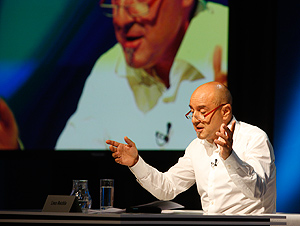 Linus Reichling (Bild: Johannes Puch)
Linus Reichling (Bild: Johannes Puch)
Video portrait
Reading
Discussion
A doctor at war
The village Quatliam. As with all foreign doctors there is a bounty of 15.000 Euro on Doctor "Martens" head. By chance he survived a bomb attack, but then because of a mistake he become a murderer: he shot a woman whom he had mistaken for a terrorist. Or was it all just imagination, the sandals left lying in the sand a mirage? After all, self-deception runs in the family.
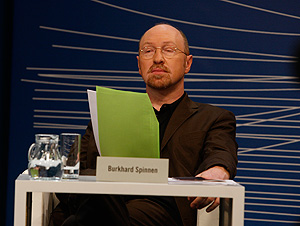 Burkhard Spinnen (Bild: Johannes Puch)
Burkhard Spinnen (Bild: Johannes Puch)
Winkels: "Low-budget TV movie"
Although at first he praised the courage of the author for thematically dealing with the deployment of German soldiers in Afghanistan, Hubert Winkels could not really warm to the text: "expertly" written and in "good language", but the text seemed like a "TV movie with too little budget." The starting point of the story is the classic Greek tragedy in which the hero is innocent of the crime for he has been charged.
Sulzer: "Text reveals a conflict of guilt"
Alain Claude Sulzer disagreed, unable to see Winkel's problem. The setting is perfectly clear, and the text keeps to the theme and explains the conflict, the birth of guilt and trauma - and he, Sulzer, would read more of this novel.
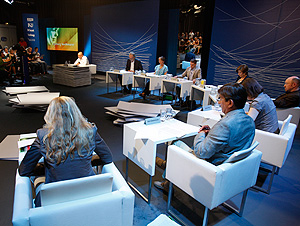 Jury (Bild: Johannes Puch)
Jury (Bild: Johannes Puch)
Jandl: "Adventure romance with morality"
"I am in the fortunate position to be able to agree with Hubert Winkels", began Paul Jandl in his commentary: the colportage is used here as an aesthetic medium, to show "real men" at work. "Who doesn't think of boots when they hear the name Martens …". The romantic adventures of the text reflects an indisputable moral - but the aesthetic medium seemed mundane; this is not the innovation that was required here in Klagenfurt.
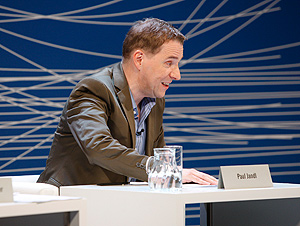 Paul Jandl (Bild: Johannes Puch)
Paul Jandl (Bild: Johannes Puch)
Feßmann: "Strong characters, strong dialogue"
Meike Feßmann put the case for the text: it was magnificently told, having strong characters and strong dialogue. The subject was treated without pathos, he also shows the conflict of the peace mission - that the lives of German soldiers were under threat and yet they are not themselves allowed to shoot. The ubiquitous "sandls" criticised by the colleagues showed the coexistence of the horrific and the everyday side by side.
Strigl stumbles over the "all too smooth"
"Yes, but... " intervened Daniela Strigl, whose objections to the text were ready to unleash. The accusation that something "trashy" is being told here was in her view too harsh. The text is interesting, plausible and focused, and one wants to continue reading, though she sometimes stumbled over "all too smooth" phrasing. "The question is: what is new in the text?" she concluded after a comparison with the novel by Ernest Hemingway "In another country". Here, in contrast to its predecessor, there is nothing hinted between the lines, there is no aesthetic progress. "A text without narrative risk", Strigl concluded.
Keller: "Character must be credible"
The reconstruction of the guilt was a "tough issue", began Hildegard E. Keller. The protagonist builds a "protective wall" against this guilt and tears it down again. Fiction allows the reader to experience something he normally never could. However, the character needs to be credible, says Keller. That one would think of Latin vocabulary and the Hippocratic Oath at such moments, is for her unlikely.
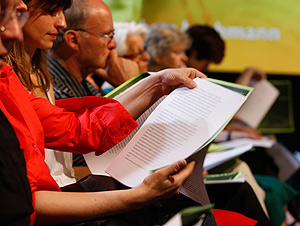 Publikum (Bild: Johannes Puch)
Publikum (Bild: Johannes Puch)
Feßmann: "Citizen-Krempel at war"
"But he does indeed brings his Citizen-Krempel to war" argued Meike Feßmann.
Burkhard Spinnen, by contrast to the others, did not really trust the text with the theme. Everything here is done with such supreme control that the text has "no spaces", leaving the subject at a distance. Every sentence, every thought, every motive goes hand in hand with the development of the character on one level, even if it is "reconstructed" - removing all mystery from the world.
"You will surely not criticise an author for his control", Meike Feßmann says protectively. This is how "space" and "tale-telling" develop; the author can control the distance to his character - an aspect not previously raised in that form.
Barbara Johanna Frank
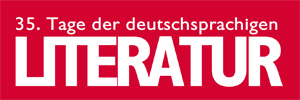 TDDL 2011
TDDL 2011